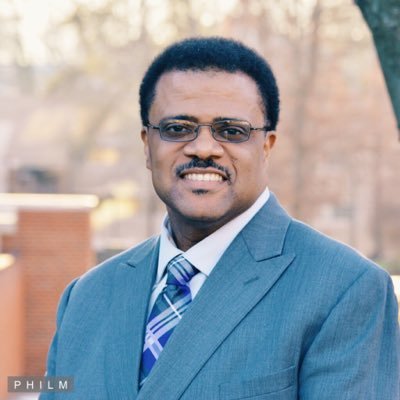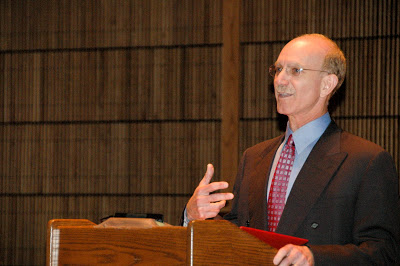Candidate for VP of Student Affairs Answers Questions at Student Forum
A student forum was held on Wednesday, Nov. 12 in the Lane University Center to provide students with an opportunity to meet a candidate for FSU’s Vice President of Student Affairs Dr. Kahan Sablo. The event featured unfiltered student questions to Dr. Sablo, who discussed his prior administrative experience, philosophy, and ideas for implementation on the FSU campus.
The forum began with an introduction of Dr. Sablo, in which Sablo reviewed his time at other institutions of higher education, most recently at George Mason University. There, he served as the Assistant Vice President for University Life. Dr. Sablo asserts he prefers small schools where he is able to maintain individual relationships and connections with students. Sablo stated he values the student voice and would like to engage with students on a regular basis if given the position at FSU. Specifically, Sablo sees his presence at campus events as opportunities to directly interact with the student body.
“I love the students you have [at FSU] and I love the diversity of the student body,” said Sablo.
Indeed, campus diversity and Sablo’s own journey with issues of diversity in academia became a focus of the forum. In discussing his personal history, Sablo cites his experience as a paramedic, minister, gospel musician, and active fraternity member as integral to his professional and personal growth. His career in university student affairs stemmed from a desire to solve issues he faced as a student in his own undergraduate experience. Specifically, Sablo recounts discrimination he faced both on the basis of his race and sexual orientation. This adversity, he recalls, had “a profound impact on [his] life.” Notably, Sablo remembers how staff members in student affairs at his undergraduate institution (SUNY-Oswego) assisted him through his struggles and impacted his professional goals.
All of the roughly 35 students in attendance were given opportunities to pose questions to Sablo at the forum. When asked how Sablo would make his presence known on campus, he described himself as “an open person” who has previously scheduled time to simply walk around and interact with students on campus at his previous institutions. Sablo states that “if my door is open, I’m available for you to come in.” Sablo recounted his history of advising multiple student organizations, asserting that “engaging with student organizations is very important to me.”
Candi Yenchenko, a non-traditional student, asked Sablo for both examples of how he has interacted with non-traditional student programs in his past experience as well as his professional opinions regarding how to best serve the non-traditional community. Sablo cited university childcare programs as an example of his past initiatives. At a previous university at which Sablo served, the university shut down the existing childcare center. In response, Sablo claims he helped create “a drop-in center” where student parents are able to stay with their children. Frostburg State University does not currently have a childcare center or facility. Of note, Sablo pointed to a life experience portfolio for-credit program he helped launch at previous universities and would be interested in exploring at FSU. In such a program, real-world skills that non-traditional students often bring with them to university may be evaluated for possible academic credit.
Isaiah Ball, an FSU student, asked Sablo about how he would attempt to improve racial relations on campus, specifically asking: “How would you utilize your position to help water down the racist front that seems to always be ignited here at Frostburg?” In response, Sablo stated campus racial relations are a “multi-pronged issue” that first requires “addressing the campus climate.” In doing so, Sablo asserted the campus curriculum plays an integral role in fostering an inclusive and safe environment for all students. In his answer, Sablo recounted an experience at a past university in which a video surfaced on social media repeatedly depicting three white female students using racial expletives 48 hours before their graduation. Sablo recalled his frustration with the lack of a curriculum to educate said students on issues relative to inclusion in increasingly multi-ethnic campus environments. In doing so, he mentioned the possibility of a “mandatory diversity class” to help educate students on these types of issues. When speaking about ensuring an inclusive campus environment, Sablo suggested that campus and student programming should be considered in an attempt to be representative of the student population. Additionally, Sablo turned to issues of faculty representation, rhetorically asking, “is the [faculty] pool representative of the student body?”
Emma Edwards, an FSU senior, asked Sablo to self-identify his own professional weaknesses. In his response, Sable described his style as “very direct.” Sablo also stated that he typically will address proverbially elephants in the room, an approach which, he said, “for some people… is less appreciated.”
FSU student Kalyn Brown asked Sablo, “based on the negative reputation about Frostburg, what is your first line of action?” In response, Sablo asserted that his first reaction to the campus community was, in fact, positive, stating he had “no reason yet to say the campus is a negative place.” When addressing campus complications in general, Sablo advocates for the campus as a whole to be factual about issues, own negative things and address them.
Cassie Conklin, an FSU student, asked for Sablo’s thoughts on the communication of processes between campus administration and the student community, and how to get more students involved in campus decisions. Sablo stated it is important to have students integrated into the planning and discussion phases of campus decisions, as well as reaching out to students outside of designated leadership positions.
FSU student Marilyn Gweh asked Sablo for his thoughts on campus student government, asserting that the current FSU Student Government Association “does a terrible job at representing the student body.” In response, Sablo asked how students are selected to serve on the student senate, to which FSU student Isaiah Ball claimed that students are selected via “interviews from small groups of people that don’t look like [Gweh].” In fact, student representatives on the FSU Student Government Association are democratically elected by the at-large undergraduate population through Bobcat Connect every spring semester for the following term. More details on the election process for SGA and how to run for a senate seat may be found on the organization’s homepage. Sablo encouraged students to run for leadership positions on campus, including those on the student senate. In response to the questions of student representation, SGA President Jenna Puffinburger invited concerned students to speak with her personally about any questions they may have.
Following Dr. Sablo’s interaction with students, FSU will host another student forum for Dr. Artie Travis, another candidate for the position of Vice President of Student Affairs. Dr. Travis currently serves as the Vice President for Student Affairs at Bowie State University, a University System of Maryland institution with an enrollment of 6,300 students. The forum will be held on Thursday, Nov. 21, at 2:15 p.m. in the Atkinson Room of Lane University Center.




